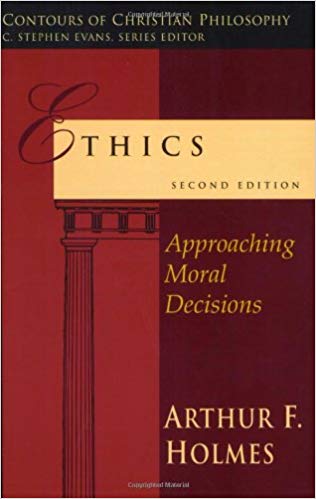A Brief Book Summary from Books at a Glance
By Greg Cochran
About the Author
Arthur F. Holmes (Ph.D., Northwestern) taught for many years in the philosophy department at Wheaton College and is the author or editor of a dozen influential books in Christian ethics.
Introduction
The Contours of Christian Philosophy series was designed first to be distinctly Christian. As series editor, C. Stephen Evans notes, “complete neutrality in philosophy is neither possible nor desirable. Philosophical work always reflects a person’s deepest commitments” (preface). Christians thus should study and write philosophy from deep convictions. These deep convictions, however, need not be adversarial or even apologetic. The Contours series seeks to engage questions of philosophy with a genuine striving for critical honesty. This process should lead Christians to influence non-Christian thinkers and non-Christians to influence Christian thinkers.
In other words, the pulse of the Contours series is engagement with the broader world from a distinctly Christian perspective. Perhaps no author was better suited to such a work in ethics than Arthur Holmes. Serving as professor of philosophy at Wheaton for more than four decades, Holmes knew the subject of ethics. But he also has a life record of engaging “all truth as God’s truth,” as one of his other books is titled. Holmes expected Christian philosophers to dialogue with and engage the larger world of philosophy.
Holmes’s volume on ethics—while thoroughly Christian—does not begin by proclaiming the origins, foundation, and outlook of Christian ethics. Rather, Holmes first unpacks ethics from the perspective of the world outside Christianity.
Table of Contents
Chapter One: The Moral Revolution
Chapter Two: Cultural Relativism
Chapter Three: Emotivist Ethics
Chapter Four: Ethical Egoism
Chapter Five: Utilitarianism
Chapter Six: Toward a Christian Ethic
Chapter Seven: Moral Knowledge
Chapter Eight: The Basis of Obligation
Chapter Nine: Human Rights
Chapter Ten: Criminal Punishment
Chapter Eleven: Can We Legislate Morality
Chapter Twelve: Sex and Marriage
Chapter Thirteen: The Ethics of Virtue
Summary
Chapter One: The Moral Revolution
In Chapter one, Holmes asserts that a moral revolution was completed in the 1960’s. While this revolution was not all bad, it did reject established norms for morality, particularly for sexual morality. Before addressing questions of morality, however, Holmes advises Christians to understand anew their own ethics. This book is Holmes’s introduction to ethics in general and Christian ethics in particular.
Ethics is an attempt to explain what is good and right. Ethics is not the same as sociology, anthropology, psychology, or political science. Those disciplines are descriptive by design, while ethics is prescriptive. Ethics asks what we ought to do and attempts to answer why we ought to do what is right. Ethics is not about what people do, but what they ought to do.
For Christians, the Bible serves as the authoritative guide, but ethical questions require thinking beyond what Scripture explicitly teaches. Ethical questions arise in situations which demand a decision about what we ought to do: Might a Christian can lie to save the Jews being hidden in the attic?
The Bible gives a theological basis for moral obligation. It gives an account of the relation of morality to God’s purposes in creation. The Bible espouses justice and love (born out of God’s character). The Bible reveals the moral law of God. It offers a powerful motive for moral living. And the Bible promises the fulfillment of God’s kingdom purposes.
Chapter Two: Cultural Relativism
Chapter two returns to the idea that Christian ethics (and the Bible) contrast with prevalent non-Christian approaches to ethics today, such as cultural relativism—the idea that moral beliefs and practices vary from culture to culture so that no moral beliefs are universally true (16). This ethical scheme exists in tension with two theses: diversity and dependency.
The diversity thesis claims that practices vary from culture to culture; none are universal. Holmes counters this thesis with the claim that cultures aren’t so diverse as to exclude common morality. Working from the research of Clyde Kluckhohn, Holmes says, “every culture is reported to have taboos against incest, for example, and against wanton killing within one’s in-group” (17). Broad similarities exist in marriage, family, economics, life and health as well.
[To continue reading this summary, please see below....]The remainder of this article is premium content. Become a member to continue reading.
Already have an account? Sign In
